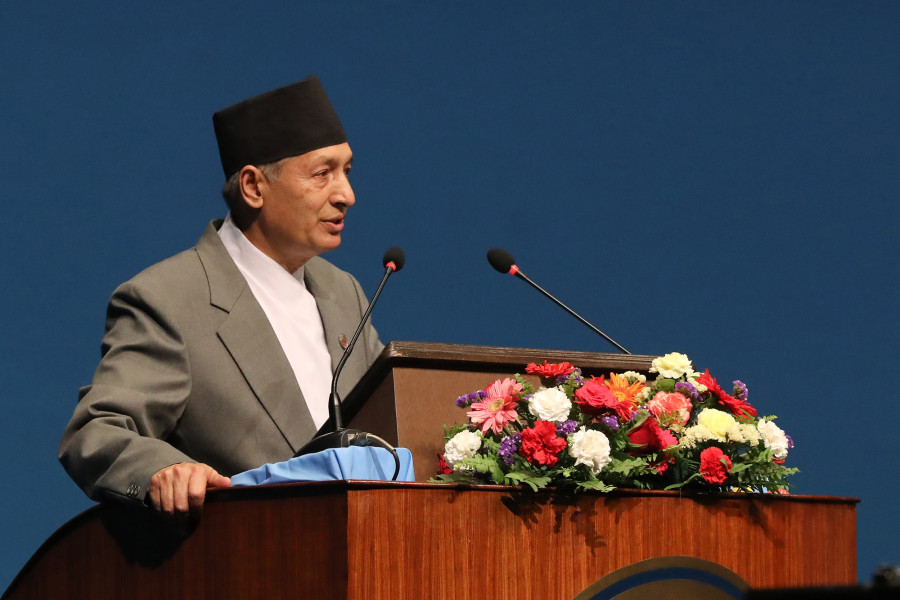Money
Federal government reduces the budget for provincial governments
Finance minister announces Rs99.85b for next fiscal against Rs 113.43b in the current fiscal
Prithvi Man Shrestha
The federal government has reduced the grant for the provincial governments for the next fiscal year 2019-20, as it has cut down conditional grants significantly while failing to increase the fiscal equalization grant.
The provinces should spend the conditional grants for specific projects handed over by the federal government to the provinces, while provinces are free to use the fiscal equalization grant in the areas prioritized by themselves.
As per the budget for next fiscal year presented by Finance Minister Yubaraj Khatiwada at the joint session of parliament on Wednesday, the combined grant ( fiscal equalization and conditional) for the next fiscal year stood at Rs99.85 billion against Rs113.43 billion in the current fiscal year.
[Read: Rs1.53 trillion: Ambitious and unrealistic]
Conditional grant has been reduced to Rs44.55 billion for the next fiscal year from Rs 63.14 billion in the current fiscal year.
But, fiscal equalization grant has been increased to Rs55.3 billion for next fiscal from Rs50.29 billion for current fiscal year.
At a time when critics are blaming the current KP Sharma Oli led government for centralizing power going against the spirit of federalism, the reduction of grants to the provinces has helped strengthen such belief.
But federal government officials have been complaining about the provincial governments’ failure to spend allocated budget.
“Our spending capacity in this fiscal year was limited due to lack of adequate staff; there were no laws and working procedures and institutions were not built,” said Prakash Jwala, minister for economic affairs and planning of Karnali Province.
“But for the next fiscal year, we have prepared a good base for spending by preparing necessary laws, institutions. Employees are also being hired. The grant to for provinces should have been increased significantly but that hasn’t happened,” he said.
According to him, there was a lack of seriousness on the part of the federal government when it came to the implementation of federalism.
“A key aspect of the implementation of federalism is to strengthen provinces and the federal budget has failed to recognise this,” Jwala told the Post.
The budget also kept complementary and special grant to be received by provincial and local governments unchanged at Rs10 billion each.
[Read: Government revises tax structure and changes income tax slab for salary earners]
The revenue share to be received by seven provinces and 753 ocal levels gas has been increased by nearly Rs17 billion to Rs130.89 billion.
The budget has not segregated revenue share, complementary grant and special grant along the line of provinces and local levels stating that these resources would be shared based on population, geography, human development index and backwardness in terms of development within 15 days after each month passes.
Overall, the total budget to be received by the provincial and local governments stood at Rs464 billion which is 30 percent of the total budget for the current fiscal year.
In the last fiscal year, they received a total budget of Rs442.74 billion, which stands at 33.66 percent of the total budget of current fiscal year.
“Concentration of budget over 70 percent at the hands of federal government clearly demonstrates it is anti-federalism,” said Bijaya Kumar Yadav, minister for economic affairs and planning of Province 2 government. “The reduction of budget particularly for the provinces shows that the current government wants to weaken the provinces.”
The National Natural Resources and Fiscal Commission was the institution which provided the formula to the government on resources distribution at provincial and local levels in terms of need, human development index, revenue collection capacity and disparity among the provincial and local governments.
But, Balananda Poudel, chairman of the commission, told the Post that they didn’t recommend how much resources each province or local level should go.
“We just gave the government the formula for distributing the resources,” said Poudel. “We have to see the projects and resource distribution to assess how the resource was distributed at the provincial and local levels.”
Related to the story:
- Education gets 10.68pc of budget share, half of what government had pledged
- Health budget increased marginally, but experts say it’s insufficient
- Senior citizens welcome increase in allowance, but say they are not fully happy
- Allocation of Rs 60 million to parliamentarians for their constituencies draws public ire




 9.83°C Kathmandu
9.83°C Kathmandu
















